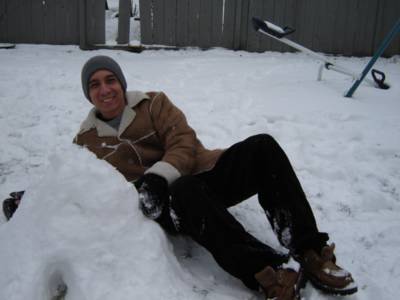Feeling like an Inuk

Photo taken yesterday, Sunday, January 9, 2005, in the seeming Winter Wonderland that was the backyard lawn of the house where I'm living here in British Columbia, Canada.

My nieces Amber and Julie had been bugging their dad, cousin Mike, for days to accompany them outside for a frolic in the snow. Mike has cough and cold so he had to pass the chores on to me. I was more than happy to oblige.
As I'd previously written, Winter has its negative effects on me: the woes, chills, hassles, gloom...
However, this time I'd rather delve on the sparkling side of it.
Wearing sufficiently insulating clothes is enough to allow you to frolic in the snow for a few hours, like how Amber, Julie, and I did yesterday. We had fun running and stumbling onto the softness of the immaculate-white snow. I was like a seven-year-old again, engaged in a snowball fight with the children. I never thought I could still laugh that way, a laugh which hid all my cares in the world.
We were supposed to build a snowman and a snowgirl and, perhaps, a snowbaby; but I realized that making a ball of snow was really a feat. I decided to construct a miniature igloo instead, which reminded me of my fascination with the Inuk culture of Arctic Canada and of Greenland and the Inupiaq and Yupik peoples of Alaska and of Arctic Siberia. Some of you might have never heard of such groups of people; but perhaps you might be happy to learn that such cultures have long been familiar to you after all, if I say that I was just using politically and linguistically as well as culturally correct terms. For, Inuit, Inupiat, and Yupiat [plural forms] are the groups of people we used to call Eskimos.
Why not call them "Eskimos" then, for simplicity's sake?
If you care about and respect other cultures, you'd rather use the specifics; for many Inuk people themselves have long dismissed the term Eskimo as derogatory. Referring to them as Eskimos is synonymous to calling Filipinos Indio, Afro-Americans Negroes, the Chinese Tsekwa, or Native American Indians Panà. (Yes, even insensitive Filipinos here in Canada would usually call such Native Americans Panà. I abhor such disrespectful people.)
"The claim that Eskimo is offensive is based primarily on a popular but disputed etymology tracing its origin to an Abenaki word meaning 'eaters of raw meat.'"
"Abenaki is any of various Native American peoples formerly inhabiting northern New England [USA] and southeast Canada, with present-day populations in Maine [USA] and southern Québec [Canada]."
A Misconception about the Igloo
Long gone were the days when the Inuk, Inupiaq, and Yupik peoples would inhabit igloos. Like any other minority, most of them now live in modern houses or permanent settlements provided by their respective governments. So, we should stop teaching children that igloos are the homes of the Eskimos, for they no longer are. This is like saying that Africans live in jungles, atop the trees, or that Filipinos live in báhay kubò, or nipa huts.
Whereas the nipa hut has now simply become a symbol of the Filipinos' regard for the family and for a simple life, the igloo—being usually made of ice and snow—is now only a symbol of such peoples' adaptability and resilience.
Today, these dome-shaped winter dwellings built of blocks of packed snow are used temporarily, especially during hunting seasons, in the same purpose tents are used not as homes but as shelters during camping trips.
So many historical facts and records are now outdated and no longer hold true, and many of these have become the roots of follies like discrimination, which usually arises from misconception and misinformation.


2 Comments:
At Tuesday, January 11, 2005 2:22:00 AM, Anonymous said…
Anonymous said…
i enjoyed the pics as well as the lecture. mwehehe!
and btw, i saw leila's testi already, aLf...which article was she referrin to?
-c.
At Tuesday, January 11, 2005 12:29:00 PM, eLf ideas said…
eLf ideas said…
My Honeydew,
Every time I'm writing you're in my mind, not because my lectures are intended for you (hahaha) but because you always inspire me to share my ideas.
The article Leila was referring to she didn't specify; but I surmise it was the series of articles in which I was relating how we found each other again after all the years that had passed.
The most heartwarming part of her message was, when she said our story gave her hope, as a mortal, that it's never too late for love to find her.
Post a Comment
<< Home